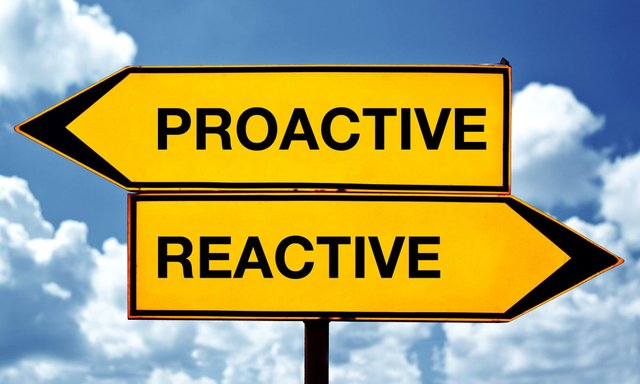The phrase "be proactive" is often associated with taking control of your life and not reacting to circumstances. Being proactive means doing what you want, not waiting for others to tell you what to do. For example, you can be proactive about getting a mole checked out, rather than waiting for someone to tell you it's time to go to the doctor. You should not be reactive when a situation is not positive or you're already overwhelmed.

Take control of your life
Learning to be proactive means anticipating events and rising above the difficulties of the moment. Taking action when needed will help you see the big picture. Avoid being reactive and think of reactivity as a symptom rather than a problem. It's important to know that your own actions are not the only ones determining the outcome. Learning from your own mistakes and growing from them will make you feel more empowered.
Be proactive instead of reactive
Proactive people are aware of their own behaviors and avoid blaming external circumstances. They know that they can choose how to act. Reactive people, on the other hand, are usually influenced by their physical surroundings. For example, when you get a bad day at work, you might blame the weather for your attitude and performance. Proactive people choose to react subtly. By choosing to be proactive, you are in control of your own behavior and can influence your own performance.
Recognize potential opportunities
One of the best ways to get ahead is to be proactive rather than reactive. People who are proactive will recognize opportunities before they arise and seize them. For instance, if you're a movie rental company, you should take the initiative to learn more about the company's culture, see how employees interact with one another, and read articles about the company's history. If you're an online retailer, being proactive can also mean recognizing opportunities before your competitors do.
Avoid being reactive in a crisis situation
While some of us instinctively react to a crisis situation, responding is a conscious choice. Taking a pause to reflect on your reactions is critical. It will give your rational mind time to catch up. By following these steps, you will be able to respond in a more effective way. Here are some tips for how to be more effective in a crisis situation:
Let the events set the agenda
The theory behind letting events set the agenda originated from the work of McCombs and Shaw. They presented their findings at the same academic conference, but Funkhouser's article was published later. He is often overlooked for his work, not least because he did not formally name his theory or continue his research after publishing the article. However, his research has been instrumental in establishing agenda setting as a viable concept. Read on to learn more.